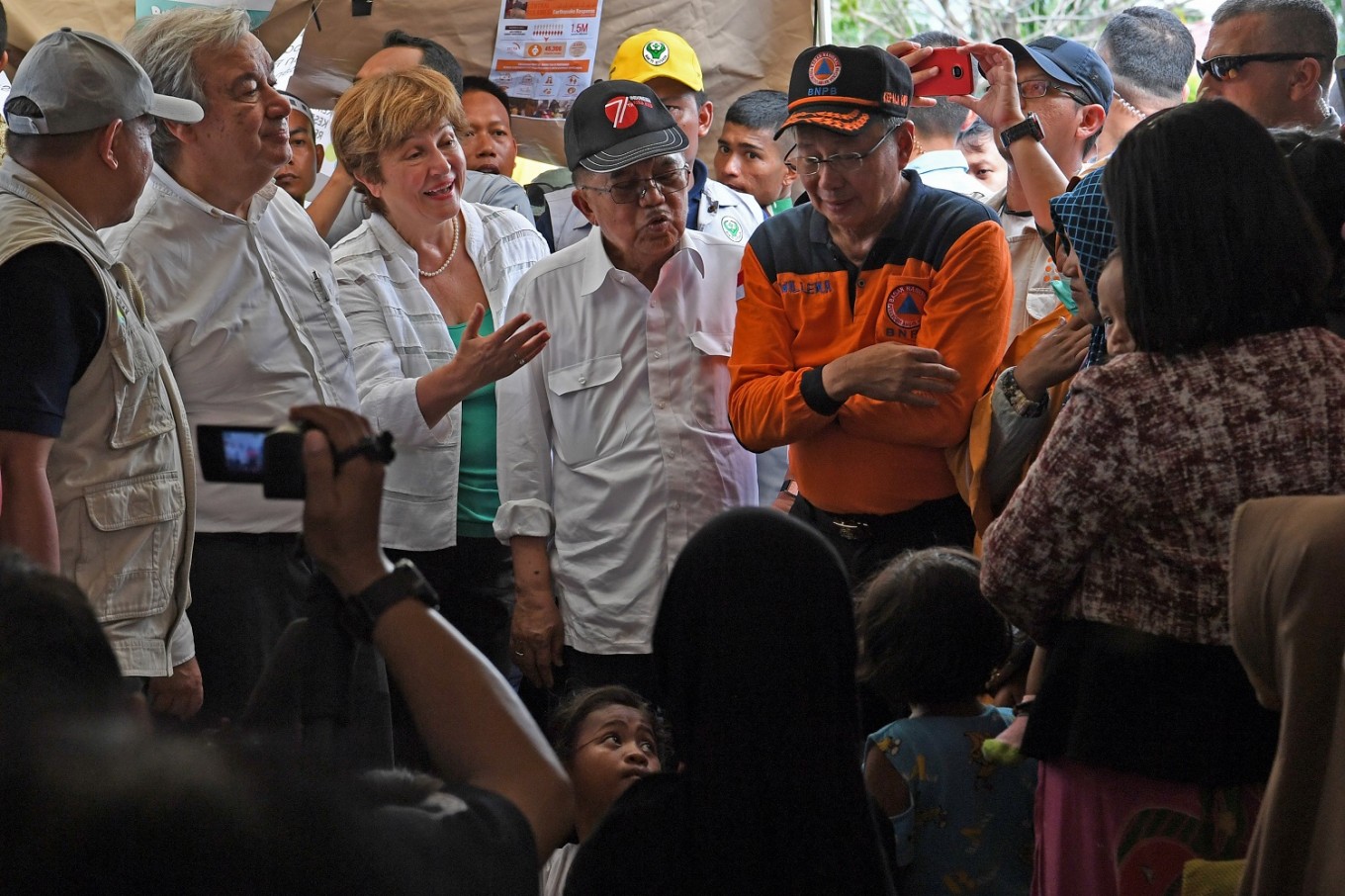UN, World Bank admire Central Sulawesi's resilience
Guterres said the UN was committed to supporting Indonesia and deploying personnel in the disaster-hit areas.
Change text size
Gift Premium Articles
to Anyone
 United Nations Secretary General Antonio Guterres (second left to right), World Bank CEO Kristalina Georgieva, Vice President Jusuf Kalla and National Disaster Mitigation Agency head Willem Rampangilei talk with survivors at Vatulemo shelter in Palu, Central Sulawesi on Friday. (Antara/Wahyu Putro)
United Nations Secretary General Antonio Guterres (second left to right), World Bank CEO Kristalina Georgieva, Vice President Jusuf Kalla and National Disaster Mitigation Agency head Willem Rampangilei talk with survivors at Vatulemo shelter in Palu, Central Sulawesi on Friday. (Antara/Wahyu Putro)
A
s Indonesia struggles to deal with the aftermath of the earthquake and tsunami in Central Sulawesi, a group of world leaders visited Palu on Friday to encourage victims and survivors.
Vice President Jusuf Kalla came to Palu together with UN Secretary-General Antonio Guterres, World Bank CEO Kristalina Georgieva and representatives from the Asian Development Bank (ADB) on Friday to visit the disaster-affected areas.
The senior officials toured the city, which included visits to the survivors living in shelters and the injured victims who received treatment in tents set up in Anutapura Hospital, which sustained damage after a 7.4-magnitude earthquake and subsequent tsunami hit the region on Sept. 28.
They also visited the ruins of the Perumnas housing complex in Balaroa, one of two subdistricts along with Petobo in Palu city that were destroyed by soil liquefaction.
During the visit to Balaroa, Guterres expressed his condolences on behalf of the UN and the international community for the catastrophe, while applauding the rapid and effective response led by the Indonesian government.
“It is the moment to express [...] enormous admiration for the resilience that was demonstrated by the population impacted by this earthquake. Their courage, their spirit of solidarity are remarkable,” Guterres said.
The string of disasters, alongside the soil liquefaction, resulted in mass destruction in a number of areas across the province — namely Palu, Sigi, Donggala and Parigi Moutong, and has claimed at least 2,073 lives with around 680 people missing.
The National Disaster Mitigation Agency (BNPB) also estimates that 5,000 people are believed to be buried in Petobo and Balaroa, while hundreds of others are thought to be buried in Jono Oge village, Sigi regency.
Guterres said the UN was committed to supporting Indonesia and deploying personnel in the disaster-hit areas.
Georgieva echoed Guterres’ sentiment, saying that she admired and respected the survivors affected by the disaster as well as the Indonesian government, which remained tough in overcoming the catastrophe.
Nearly 79,000 evacuees are still living in 112 evacuation sites in the province. Some of the evacuees, whose houses were only lightly damaged, are able to return home but refuse to do so for fear of aftershocks.
Georgieva said the World Bank was ready to assist the government in the reconstruction of infrastructure and homes that were damaged in the disaster, which, according to the bank’s preliminary assessment, caused US$531 million in losses.
As the first phase of financial assistance, the World Bank has delivered $5 million to the Indonesian government, Georgieva said. “The World Bank will cooperate with the Indonesian government in building houses for the people who lost their [homes] and create a better life for them in the future,” she added.
The government has extended the emergency response period in the province for another two weeks until Oct. 26 to focus on accelerating provisions for survivors, such as the needs of the displaced, fixing facilities, temporary shelters and medical treatment.
Kalla said during the period, the authorities would prioritize the fulfillment of logistics, medical and clean water supplies for the survivors, adding that the construction of temporary housing would follow soon and was expected to be completed in a maximum of two months.
The government will establish a task force comprising relevant institutions, including the Public Works and Housing Ministry and the local government, to handle the rehabilitation and reconstruction phase, Kalla said.
“The task force will work together with the BNPB and other stakeholders,” Kalla said.
Meanwhile, volunteers from Central Java have begun to build 100 temporary homes for survivors who lost their houses in the soil liquefaction in Petobo. The 20 square meter buildings will be built of light steel in areas unaffected by the liquefaction.
“The first phase of temporary housing will be prioritized for families with children and those who suffered injuries, pregnant mothers, the elderly and widows,” said the team’s coordinator Budi Laksono.
Editor's note: This article has been updated to correct the paragraph on the World Bank’s estimate of losses caused by the disasters in Central Sulawesi.










